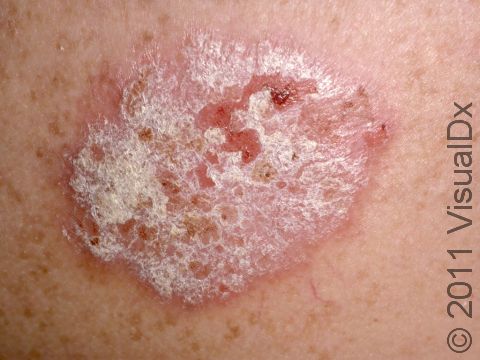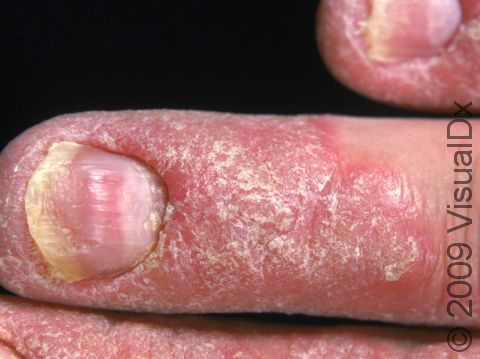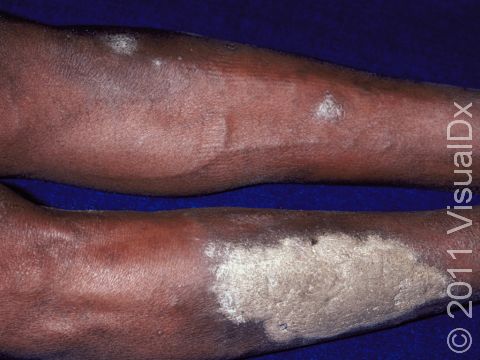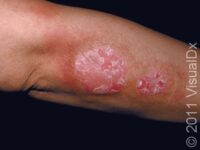See more pictures of psoriasis
Psoriasis is one of the most common skin conditions treated by dermatologists and it affects a significant proportion of the US population. Whether you’ve known it or not, chances are you’ve already encountered several people who have psoriasis in your life. Let’s learn a bit more about psoriasis by going over 5 common questions that you might have.
What is psoriasis and what does it look like?
Psoriasis is a chronic immune-mediated skin condition that results in hallmark plaques (large elevated skin lesions), commonly located on the knees, elbows, and scalp. These plaques are typically pink or salmon colored, with sharp, well-demarcated borders, and they often have silvery scale. The picture below shows an example of a psoriatic plaque that demonstrates the classic features described. While this is the most common presentation, psoriasis has many variants and can present in other ways as well.
How common is psoriasis?
Psoriasis is one of the most common skin conditions in the United States affecting over 2% of the population. This means that the total number of individuals living with psoriasis in the US is around 7.5 million, which is greater than the entire population of Massachusetts. Due to its high prevalence and chronic nature, the total cost of psoriasis in the US is estimated to be around $11.25 billion each year, including the cost of treatments as well as the time lost at work by patients with psoriasis.
What causes psoriasis?
Psoriasis is a multifactorial disease, which means that many factors play a role in development. The exact cause of psoriasis is complex and still isn’t entirely understood, but research currently points to genetics, the environment, and the immune system as the major players in the development of psoriasis. Certain genes may put a person at risk of developing psoriasis, and environmental triggers (stress, certain medications, infection, or injury, for example) can inappropriately trigger the immune system. This ramped-up response leads to skin cells that turn over too rapidly and accumulate into the thick pink plaques that we can see on the skin.
Is psoriasis dangerous or contagious?
Fortunately, psoriasis isn’t contagious and is rarely life-threatening. The vast majority of patients, especially those who are treated, will go on to live long, happy lives. Certain rare forms of psoriasis, such as erythrodermic psoriasis, can potentially be life-threatening and can pose an immediate health risk, but most of the time psoriasis is not emergent and can be treated on an outpatient basis in dermatology clinics. Psoriasis is also associated with many other medical conditions and often presents with more than just skin symptoms. Psoriatic arthritis is one of the the most notable changes and can manifest as joint pain and damage that may eventually lead to loss of function. Nail changes are also a common finding in psoriasis patients.
How is psoriasis treated?
The treatment of psoriasis is very complex and will vary from patient based on the areas of skin involved and the severity. Rather than delve into the nitty-gritty details, we’ll discuss some of the broad treatment categories. Since psoriasis has an immune component, topical steroids are one of the mainstays of treatment as they can help tone down the inflammatory response and halt the progression and formation of plaques. Although topical corticosteroids are commonly used, oral steroids are generally avoided as they have negative long-term effects and often lead to a severe rebounding of psoriasis when discontinued. Salicylic acid is another treatment option that can be used to remove the scale and wear down the thickness of psoriatic plaques. This can be useful when used with other topical medications as it allows for better medication penetration. Other commonly used topical agents include vitamin D derivatives, retinoids, and tar treatments. Another treatment option is ultraviolet light; both sun exposure and in-office UV light treatments can improve psoriasis and are useful for widespread cases. Finally, some cases of psoriasis, especially severe ones, may need to be managed with systemic medications. Many of these medications act to modulate the immune system in ways that can lead to drastic improvement, especially for those with widespread lesions. Because there are so many treatment options, it’s important to see a dermatologist who can best determine the ideal treatment on a case-by-case basis.
Sources/Further Reading
Last modified on December 9th, 2022 at 9:10 pm



